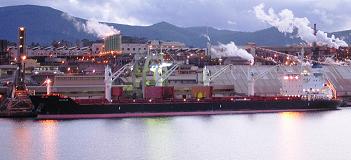 Morocco exploits Western Saharan natural resources for its own profit while the rightful owners of the land languish in refugee camps and are dependent on dwindling humanitarian aid. This appropriation of land and resources is the most pernicious offence committed against the Saharawis, especially with regard to how Morocco has literally divided and conquered Western Sahara.
Morocco exploits Western Saharan natural resources for its own profit while the rightful owners of the land languish in refugee camps and are dependent on dwindling humanitarian aid. This appropriation of land and resources is the most pernicious offence committed against the Saharawis, especially with regard to how Morocco has literally divided and conquered Western Sahara.
In comparison to other infamous architectural barriers as the Berlin Wall and the West Bank Wall, the Moroccan military wall that carves the territory of Western Sahara in two may be relatively obscure, but it is certainly no less brazen or invidious. The wall was put up by the Moroccans during the 1980s as a defence against Saharawi guerrilla incursions. However it has since grown into a 2200km long structure with the world’s largest minefields on either side, essentially dividing the land into two from north to south. The resource rich territory to the west of the wall is under Moroccan control, while the eastern sector is administered by the Polisario, a Saharawi political independence movement.
Moroccan exploitation of Western Saharan phosphates and fish is already a well-established regime that brings in hundreds of millions of US dollars a year. The Saharawi refugees do not see a cent of these profits that amount to more than 10 times the international aid they receive annually. Even more disturbing are the impending oil explorations off the Western Saharan coast to be conducted on behalf of the Moroccan government. If this project were to come to fruition, this would be a further blow to the current and future self-sufficiency of the Saharawis.
In short, the Moroccan government’s acts of occupation and resource exploitation amount to continuing breaches of a plethora of international laws, such as the international law of the sea and of armed conflict. In the sphere of international humanitarian law, the Saharawi people are being denied their right to self-determination, and many other civil, political and economic rights. However, for the last 40 years, the Western Saharan crisis has been so neglected that it barely registers as a footnote on the long list of inequities that the global community has failed to curtail. It is time to take action against these injustices, and devise a solution that is befitting of the technological, economic, and social advances of the 21st Century.
Links
Reports from Western Sahara Resource Watch
Illegal phosphate importation by Australian companies
Department of Foreign Affairs and Trade Statement on international law considerations with importing natural resources sourced from the Western Sahara
